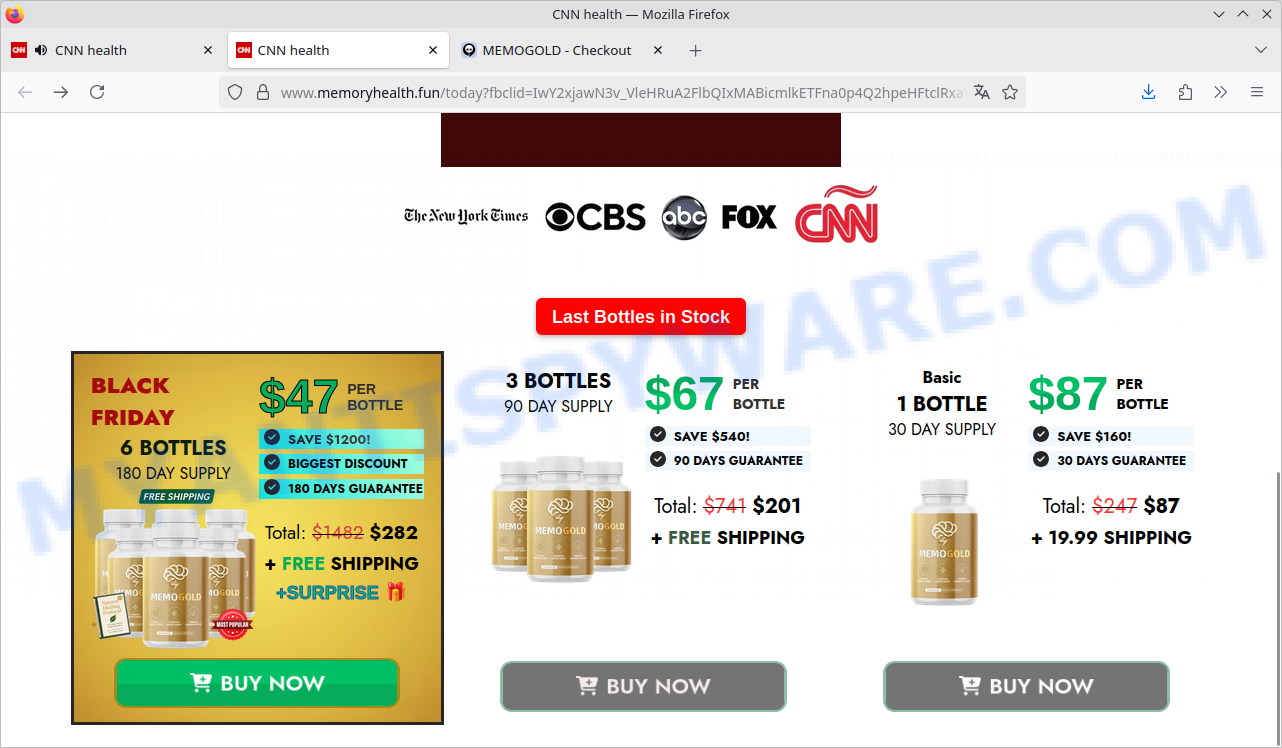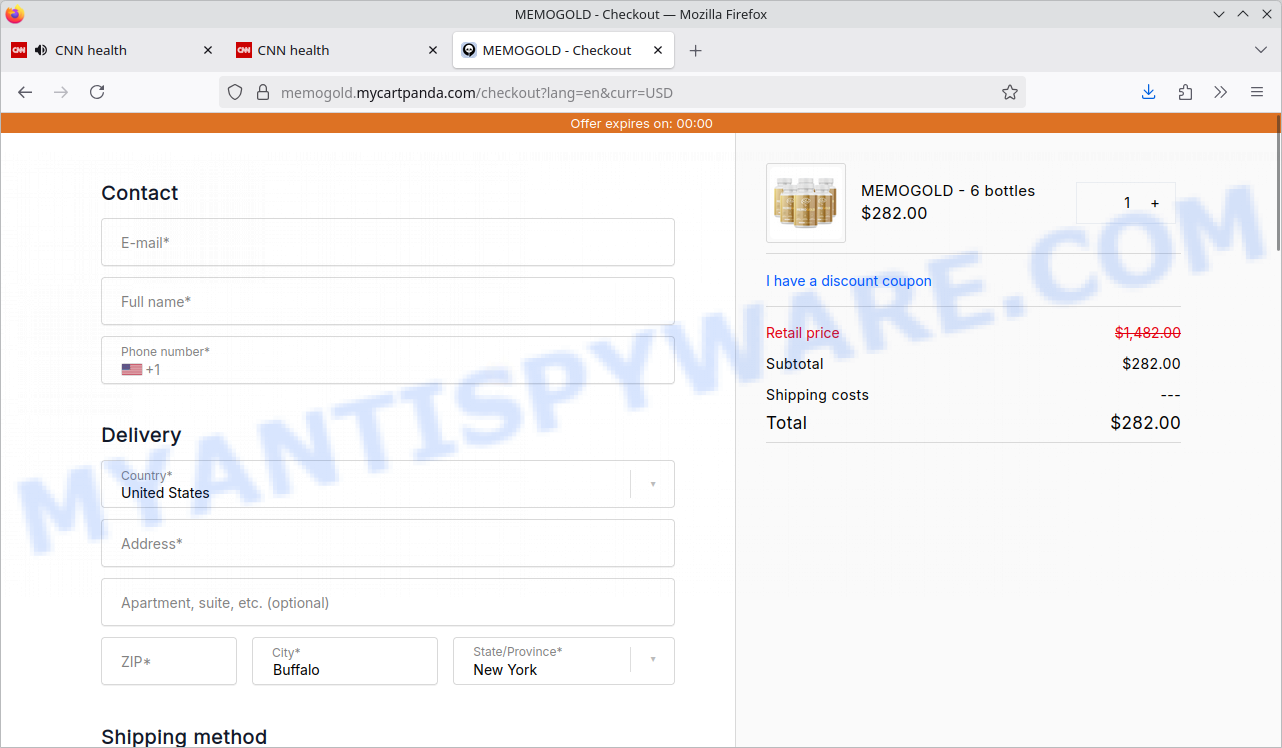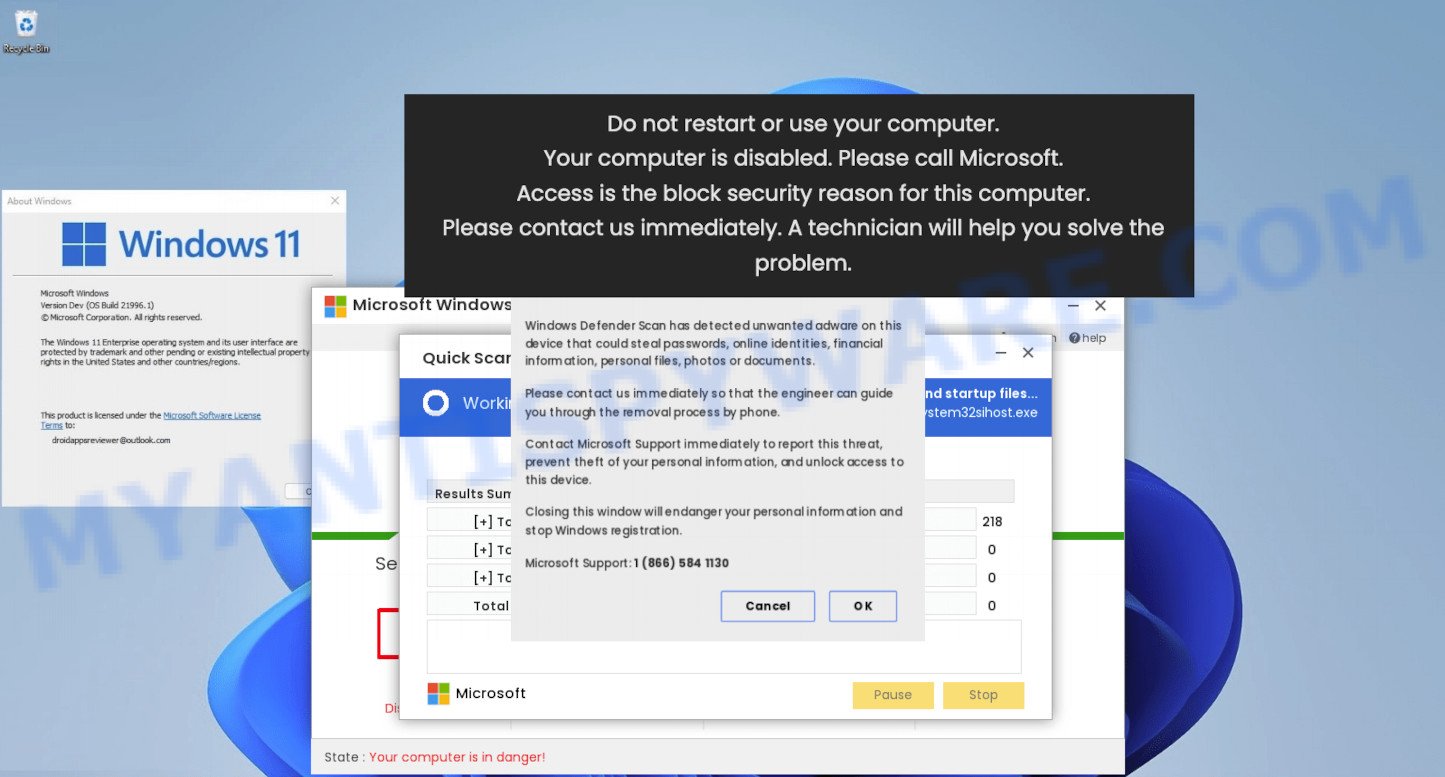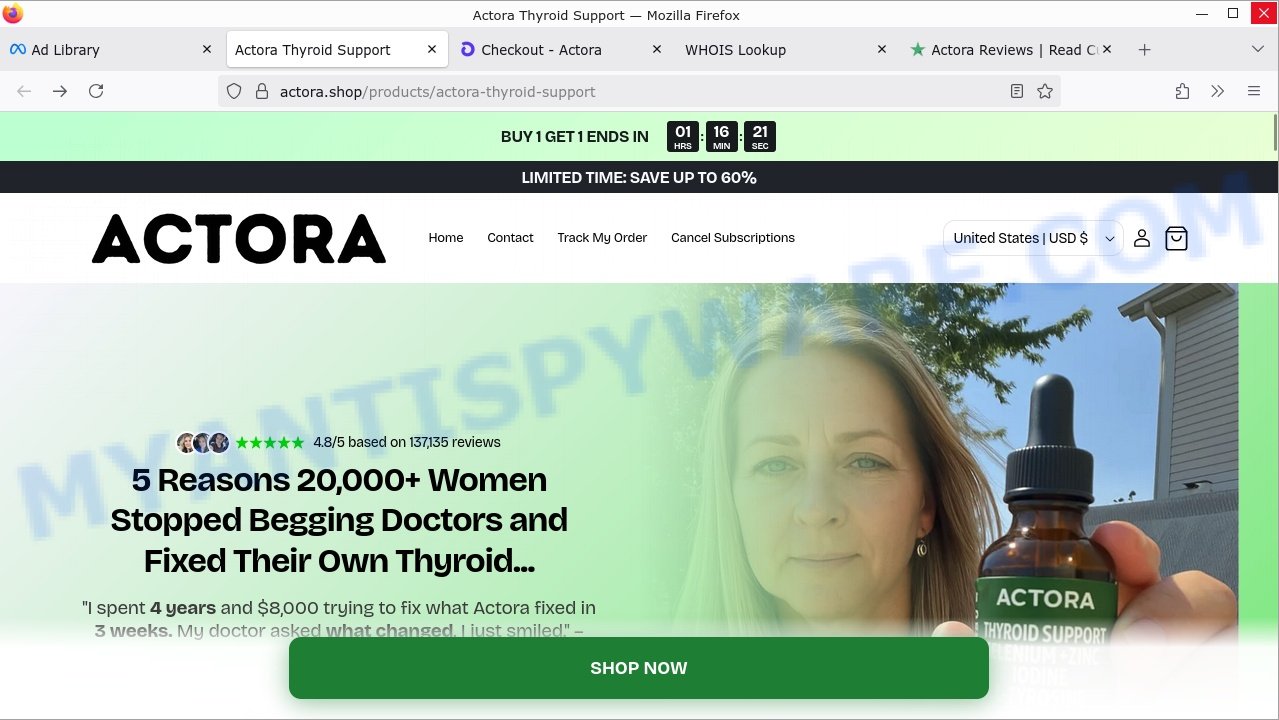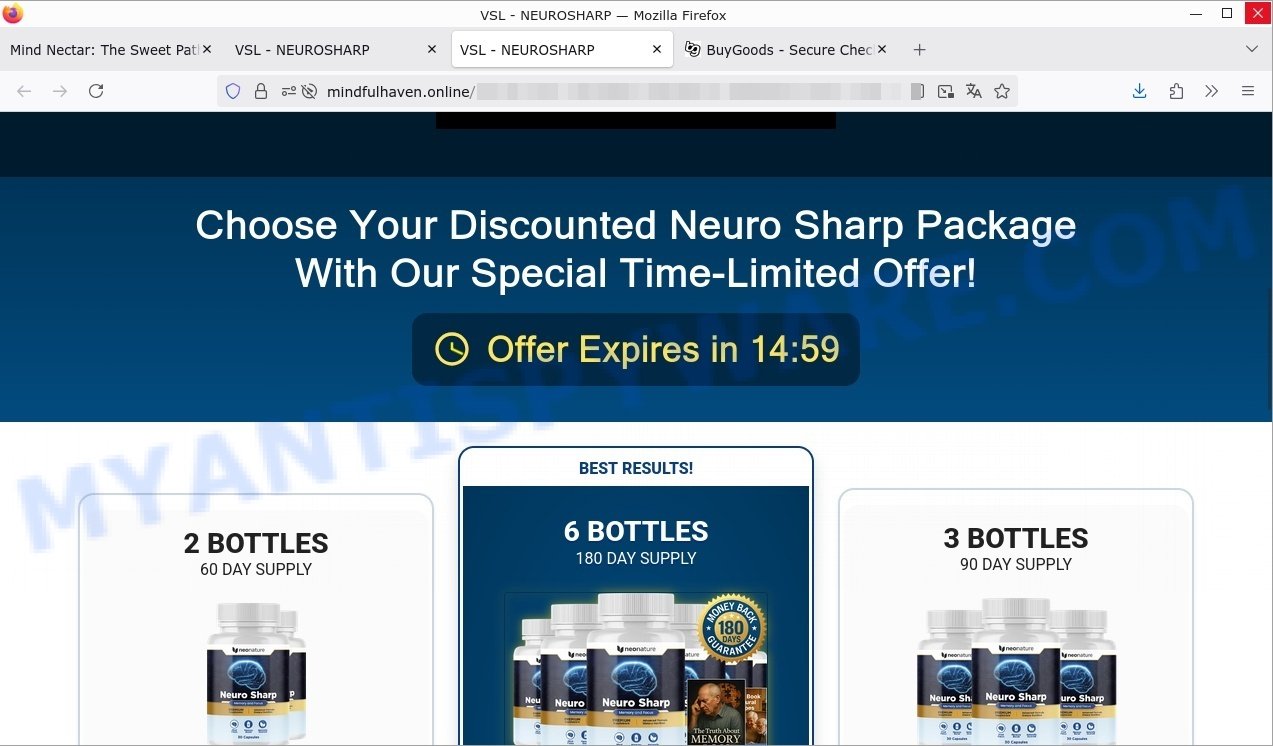A new wave of online scam ads is circulating under the name MemoGold, claiming to offer a “Golden Honey Tonic” that can reverse Alzheimer’s disease and restore memory. The scheme starts with deceptive video ads on Facebook and Instagram and leads to a fake CNN-style article hosted on memoryhealth.fun. The entire setup is designed to sell overpriced “MemoGold” capsules while impersonating doctors, media outlets, and medical institutions.
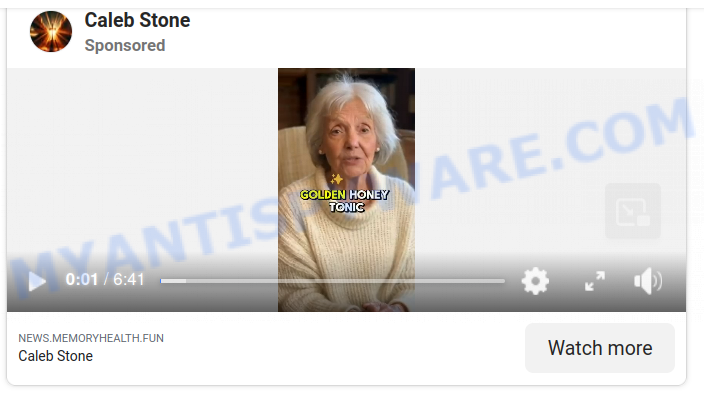
The scam begins with a Facebook ad labeled “Caleb Stone”. It features an elderly woman saying she used a “Golden Honey Tonic” to recover her memory. The short video promises a simple home remedy and includes the phrase “GOLDEN HONEY TONIC” in yellow text, directing viewers to click a link that opens the domain news.memoryhealth.fun.
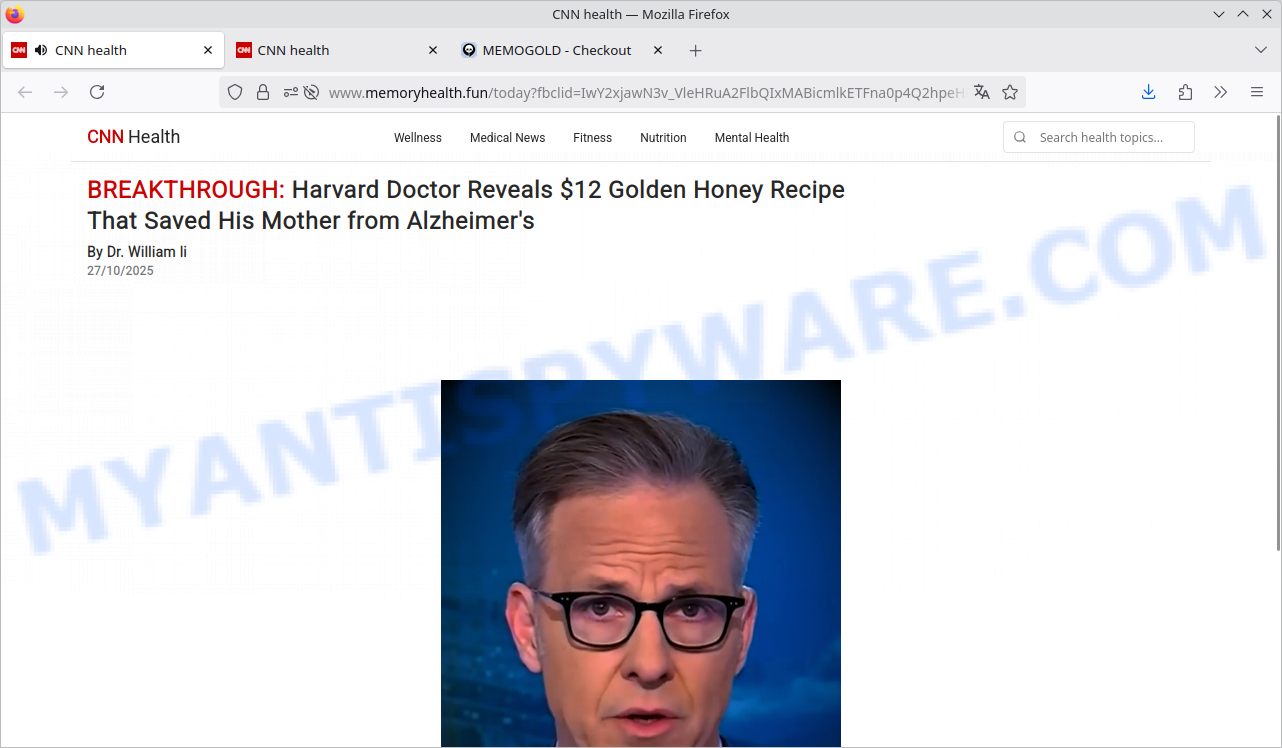
Once clicked, the viewer lands on a fake CNN Health article titled “BREAKTHROUGH: Harvard Doctor Reveals $12 Golden Honey Recipe That Saved His Mother from Alzheimer’s”. The article is credited to “Dr. William Li” and dated October 27, 2025. It mimics CNN’s design with its logo and navigation tabs like “Wellness”, “Medical News”, and “Fitness”. However, the page is hosted on memoryhealth.fun, not CNN’s real domain (cnn.com). Below the headline, screenshots show a man appearing to be a news anchor, framed to look like a CNN broadcast, reinforcing the illusion of credibility.
The embedded video section on the fake page features the same man speaking in a studio-style setting with “BREAKING NEWS” text and captions about “a new discovery that will change Alzheimer’s treatment.” The clip never reveals the “recipe” or any medical details — it instead transitions into promoting the supplement MemoGold as the supposed miracle cure.
The page uses fake credibility elements, including logos from CNN, CBS, ABC, FOX, and The New York Times. These logos are arranged below the video to imply endorsements. The text mentions patents, Harvard research, and pharmaceutical interest, but none of these claims have verifiable sources. There are no links to scientific studies, no legitimate medical citations, and no verified social media comments or reviews.
Scrolling down reveals the product offer section, where “MemoGold” is marketed in white-and-gold bottles. Prices are displayed as massive discounts: “6 Bottles for $47 each”, “3 Bottles for $67 each”, and “1 Bottle for $87”. Fake urgency is created with red text reading “Last Bottles in Stock” and “Black Friday Dea”. The layout uses bright green “BUY NOW” buttons and promises “Free Shipping” and “180 Days Guarantee”.
Checkout pages redirect to memogold.mycartpanda.com, a third-party payment processor called Cartpanda. This platform has been linked to numerous other suspicious supplement sales and consumer complaints. The checkout form asks for full name, email, phone number, and address, alongside a live countdown timer suggesting the “offer expires in 00:00”. This creates pressure to buy quickly before the user can verify legitimacy.
The product description page further displays false authority badges, including “FDA Approved”, “GMP Certified”, and “Non-GMO”. These graphics are purely decorative; the U.S. Food and Drug Administration does not certify dietary supplements in this way. The “100% Money Back Guarantee” claim is another deceptive hook, as refund requests to Cartpanda-linked vendors are frequently ignored or denied.
In reality, there is no “Golden Honey Tonic” formula, no Harvard research, and no evidence that any product called MemoGold can treat Alzheimer’s or improve memory. The supposed “Dr. William Li” attribution is fraudulent, as no such CNN article exists and the real physician by that name has no connection to this promotion. The site and product exploit stolen images, fake testimonials, and fabricated credentials to appear credible.
💡 Heads-up: Similar Scams Are Everywhere. MemoGold is not unique. It is one of many fake supplements, gadgets, and other schemes we expose in our Fact Checks section. All of them aim to grab your personal data or money. The people behind these scams run slick websites, spread bogus promo codes, and even pose as trusted brands or experts. Below are a few recent scams that follow the same playbook as MemoGold: Reviewsepho.com, Actora Thyroid Drops, IFMAGIC GLP-1 Pro Weight Loss Oral Solution, Orivelle Nail Fungus Pen, Harley Advent Calendar 2025.
🚨 Is MemoGold a Scam?
MemoGold is being aggressively promoted as a miracle “Golden Honey Tonic” that claims to reverse Alzheimer’s disease and restore memory, but these claims are completely fabricated. The marketing tactics revolve around deceptive video ads, fake news article replicas, and bogus endorsements designed to scam vulnerable consumers seeking cognitive health solutions.
Key Red Flags:
- 🌐 Fake Promotional Campaign: MemoGold ads appear on Facebook and Instagram featuring staged testimonials and urging viewers to visit a fake news-style website (memoryhealth.fun) mimicking legitimate media outlets like CNN, CBS, and ABC to gain false trust.
- ⭐ Fraudulent Credentials and Impersonations: The site falsely credits “Dr. William Li” and claims association with Harvard research and major pharmaceutical interests—all without any verifiable proof or authentic references.
- 🔒 Bogus Media Branding: Logos from reputable broadcasters and newspapers are copied and displayed on the site in an unauthorized way to create an illusion of credibility and endorsement.
- ⚠️ Exaggerated Health Claims: The tonic is touted as a groundbreaking Alzheimer’s remedy with no scientific evidence, clinical trials, or FDA approval supporting such claims.
- 📉 Suspicious Purchase Process: Clicking “BUY NOW” redirects to third-party payment processors like Cartpanda, known for involvement in scam supplement sales, with pressure tactics including countdown timers and fake stock alerts.
- 👤 Deceptive Guarantee and Certifications: The site boasts FDA approval, GMP certification, and a “100% Money Back Guarantee” that are either false or unenforceable, leaving buyers without real consumer protection.
- 🔗 Privacy and Financial Risk: Providing personal and payment information risks identity theft, unauthorized charges, and loss of money, as victims often report not receiving any product or facing problematic refunds.
In summary, the MemoGold “Golden Honey Tonic” is a sophisticated scam preying on those desperate for Alzheimer’s cures. Its use of fake media sites, impersonated experts, false product claims, and questionable payment portals all point to a fraudulent scheme. Avoid purchasing MemoGold and rely only on verified medical advice and treatments for cognitive health issues.
😱 What to Do If Scammed
If you find yourself ensnared by the MemoGold Scam, immediate action is crucial. Here’s what you should consider doing:
🛑 Stop Further Transactions
The first step is to halt any additional transactions that might be in process. Contact your bank or credit card provider and inform them that you’ve fallen victim to a scam. They can help by blocking the card or reversing any unauthorized transactions.
📞 Report the Fraud
File a report with your local police and provide all the available evidence, such as screenshots, emails, and website URLs. Additionally, report the scam to online portals like the Better Business Bureau (BBB) at www.bbb.org or the Federal Trade Commission (FTC) at reportfraud.ftc.gov. If you’re in another country, reach out to your national consumer protection agency.
💻 Take Screenshots
Before the scam website gets taken down or changes, make sure to capture screenshots of your transactions and communications. These can serve as evidence if you decide to pursue legal action.
⚖️ Consult Legal Advice
Speak to a legal advisor about your situation. While pursuing legal action may be time-consuming and costly, it could be a possible avenue for recovering your lost money.
📢 Share Your Experience
Use social media platforms to share your experience and warn others about the scam. Your story could prevent someone else from falling victim to the same or similar scams.
Summary Table
| Factor | Observations | Impact on Legitimacy |
|---|---|---|
| Product Description | MemoGold claims to be a “Golden Honey Tonic” that can reverse Alzheimer’s disease and restore memory. The product is marketed as a natural and effective remedy backed by fake medical endorsements and false claims about patents and Harvard research. No real evidence supports these promises. | Negative (False medical claims and unsubstantiated health benefits) |
| Advertising Method | The scam starts with deceptive Facebook and Instagram ads featuring fake testimonials. These ads lead to a counterfeit CNN-style news article on a fake website designed to look like a trusted news source. | Negative (Misleading ads using fake testimonials and false news sites) |
| Website and Presentation | The main site copies CNN’s style and logos from major media outlets like CBS, ABC, FOX, and The New York Times. However, it uses a fake domain unrelated to these organizations, aiming to trick visitors into believing the article and product are credible. | Negative (Use of fake media logos and misleading website design) |
| Product Pricing and Offers | MemoGold is sold at heavily discounted prices with pressure tactics such as countdown timers, limited stock warnings, and “Black Friday” deals to push quick purchases without time for careful review. | Negative (High-pressure sales with artificial scarcity and price tricks) |
| Checkout Process | The checkout redirects to a suspicious third-party platform called Cartpanda, which has a history of scam complaints. It requests detailed personal and payment information while continuing to create urgency with timers. | Negative (Suspicious payment processor and aggressive data collection) |
| Product Claims | Badges on the site falsely claim FDA approval, GMP certification, and “Non-GMO” status. These are misleading as the FDA does not approve supplements in this way, and no proof is provided for these claims. | Negative (False certification claims and deceptive marketing) |
| Refund Policy | Though a “100% Money Back Guarantee” is advertised, customer reports indicate that refunds are often denied or ignored, making the policy unreliable. | Negative (Unreliable refund policy and poor customer support) |
| Credibility of Medical Sources | The named doctor and purported CNN article are fake. The product uses stolen images and false endorsements to appear credible, but no authentic doctor or medical institution supports these claims. | Negative (Fraudulent medical endorsements and fake news articles) |
| Consumer Risks | Users risk losing money, have their personal information exposed, and may face unauthorized charges. There is no guarantee of receiving any product after purchase. | Negative (Financial loss and privacy risks for consumers) |
| Official Endorsements | Neither CNN, Harvard, nor any credible health expert endorses MemoGold or “Golden Honey Tonic”. Legitimate organizations warn against this scam. | Negative (Complete lack of official support or verification) |
Conclusion
The MemoGold “Golden Honey Tonic” is a scam that relies on fake news articles, deceptive celebrity impersonations, and fabricated endorsements to mislead consumers. The promoters behind MemoGold use fake medical claims, counterfeit media branding, and urgent sales pressure to trick vulnerable individuals into buying overpriced supplements that do not deliver any real benefits for Alzheimer’s or memory improvement.
Instead of offering a genuine cure or proven remedy, MemoGold’s marketing is built on a foundation of lies, including bogus doctor attributions, falsified patents, and sham research references. The website mimics reputable news outlets like CNN, featuring fake logos and doctor quotes, to create a false sense of authority. Additionally, fake urgency tactics, suspicious third-party checkout processors, and unrealistic discount offers are designed to pressure buyers before they can verify the product’s legitimacy.
Bottom Line: Avoid MemoGold “Golden Honey Tonic”. Always approach miracle cure claims with skepticism, especially if they use fake testimonials, counterfeit news sites, and unverifiable credentials. Protect your personal information and financial security by steering clear of products tied to scams or fraudulent payment platforms.
